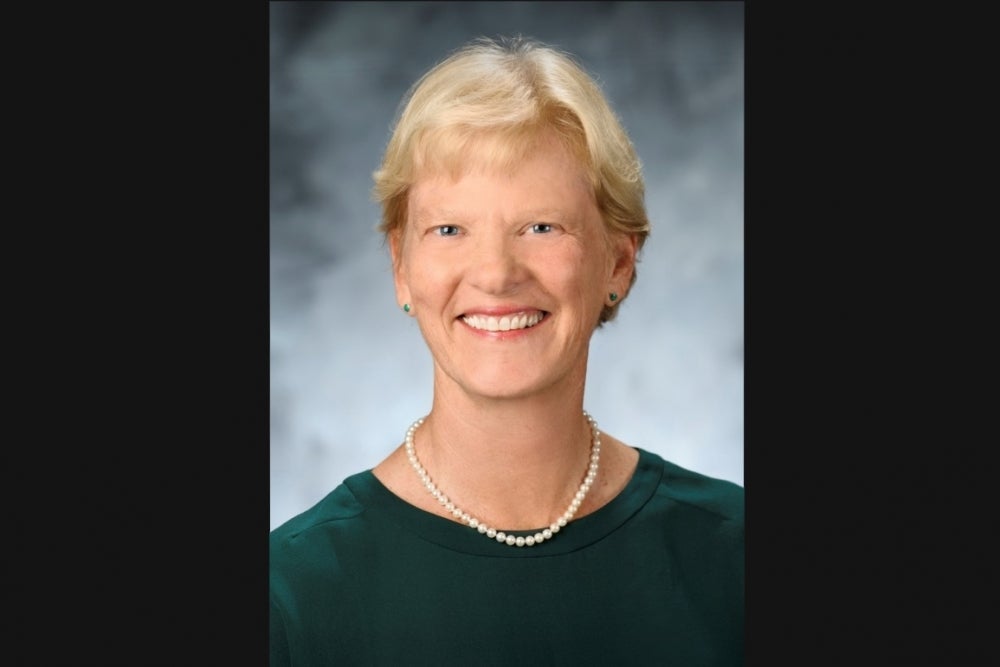
‘Foundational for the Development of the Field’
The UC Santa Barbara Academic Senate has awarded Distinguished Professor Alison Butler the Faculty Research Lecture Award for 2020.
“I congratulate Alison on receiving the highest honor bestowed by UC Santa Barbara’s faculty senate,” said Pierre Wiltzius, executive dean of the College of Letters and Science. “As a pioneer in the field of metallo-biochemistry, and a leading scholar on this campus, she is most deserving of this recognition.”
Said Steve Buratto, professor and chair of the chemistry and biochemistry department, “Professor Butler is one of our most highly decorated faculty members. For over 30 years she has exemplified what is to be a truly great researcher: highly creative with an interdisciplinary spirit coupled with hard work. Her colleagues in the Department of Chemistry and Biochemistry are very proud of her and can think of no one more deserving of this award.”
“I’m so grateful,” Butler said, “I couldn’t have found a better department to have started my career, and in fact to have actually developed my whole career.”
Butler’s research focuses on bio-inorganic chemistry with an emphasis on the roles of metal ions in metallo-enzymes. Although the topic may seem obscure, it’s of no small importance. “All life depends on metallo-enzymes to function,” Butler said, “from breathing to photosynthesis to nitrogen fixation.”
She is particularly curious about the molecules and processes by which microbes acquire the transition metals they need to grow, which can be quite difficult to obtain from the environment. Transition metals are often locked away in oxides and minerals or in the complex proteins of host organisms.
To acquire the metals they so desperately need, many bacteria secrete small molecules called siderophores that scour the surroundings of a particular metal, most often iron. Butler is working to predict the forms and functions of these molecules using genomics, as well as what other metal ions microbes may sequester using these and other microbial ligands.
Butler suspects these small molecules may have additional functions as well, completely unrelated to metal sequestration. For instance, she and her colleagues are looking at the wet adhesion properties of siderophore cyclic trichrysobactin, which resembles and mimics the proteins that keep mussels secured to rocks.
With its unique chemistry and signs of applicability to fields such as materials and medicine, this subject has begun to attract a number of other researchers. “I feel like we played a small part in opening up the excitement and importance of metallo-biochemistry and bio-inorganic chemistry of the marine environment,” Butler said.
She is the recipient of numerous honors and awards, including the American Chemical Society’s Alfred Bader Award in 2018 and the Cope Scholar Award the following year. The society generally specifies a five-year span between awards unless each award recognizes distinct achievements, making Butler’s recognition truly exceptional.
Also in 2019, she was elected Fellow of the American Academy of Arts and Sciences as well as of the Royal Society of Chemistry, who additionally bestowed upon her the society’s Inorganic Reaction Mechanisms Award.
Butler has mentored 37 doctoral students and postdoctoral scholars, many of whom have gone on to develop stellar careers of their own. She has found time to share her leadership capability with the campus, serving as the vice chair of the chemistry department, associate dean of bioengineering, and currently as associate vice chancellor for academic personnel.
In announcing the Faculty Research Lecture Award, the committee noted Butler’s “seminal contributions” to research, citing her for having “expanded the field of siderophore research, discovering new classes of siderophores, and new reactivity of the iron(III)-siderophore complexes.” Of specific note was her discovery of the photoreactivity of Fe(III)-bound to siderophores with alpha-hydroxy carboxylic acids. Researchers have worked with some of these compounds for 40 years without ever recognizing this property.
To quote one of Butler’s nominators: “Her work is foundational for the development of the field and the understanding of biological productivity on Earth.”
Butler looks forward to sharing her enthusiasm for bio-inorganic chemistry with the community when she gives her lecture. “As daunting as it feels, when I actually get down to thinking about how to present this, I’m really excited,” she said. She hopes to include audience participation and demonstrations in her lecture.
Reflecting on her selection for the Faculty Research Lecture Award, Butler said, “It’s totally special because it’s really my immediate community. Who knew, when I started off at UCSB as an assistant professor in 1986, that this is where I could get.”



